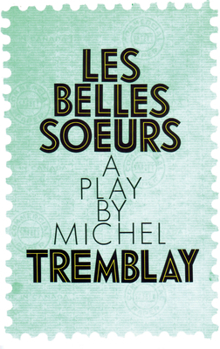Les Belles Soeurs
Select Format
Select Condition 
Book Overview
Germaine Lauzon has won a million trading stamps from a department store. Her head swimming with dreams of refurbishing and redecorating her working-class home from top to bottom with catalogue selections ranging from new kitchen appliances to "real Chinese paintings on velvet," she invites fourteen of her friends and relatives in the neighbourhood over to help her paste the stamps into booklets. Raucous, reckless and rude, the women shamelessly share their most secret hopes and fears, complain stridently about their friends and relatives, fantasize wistfully about escaping the misogynist drudgery of their lives and surreptitiously tuck most of the stamps into their purses and clothing, self-righteously appropriating what they consider to be Germaine's "illegitimate" good fortune. While earlier attempts had been made to stage the realities of Qu b cois life using colloquial language and a realist backdrop of working-class Montr al, these populist hits were considered rustic and anomalous, while "real" (Parisian) French continued to dominate theatre and "high culture" until the end of the 1950s. As Qu bec searched for a new socio-political identity and a language that could articulate its rapidly emerging post-colonial reality throughout the "quiet revolution," Michel Tremblay struggled to find an authentic Qu b cois voice. Written in 1965, it took three years for him get a first production of Les Belles Soeurs in 1968. Premiering at the Th tre du Rideau-Vert in the same year that Ren L vesque founded the nationalist Parti Qu b cois, this first of what was to become more than a dozen plays in Tremblay's Cycle of Les Belles Soeurs became an overnight success. In one fell stroke, Joual, the distinctive Qu bec vernacular that had evolved over centuries since the end of French colonial rule had been legitimized, and Michel Tremblay, much like Chaucer in English and Dante in Italian, had become "the father of the Qu b cois language."
Format:Paperback
Language:English
ISBN:0889223025
ISBN13:9780889223028
Release Date:February 1992
Publisher:Talonbooks
Length:112 Pages
Weight:0.36 lbs.
Dimensions:0.3" x 5.3" x 8.4"
Customer Reviews
2 ratings
Once controversial, now a classic in Quebec
Published by Thriftbooks.com User , 15 years ago
A play between book covers rarely measure-up to the "live happening" itself. This is particularly evident with "Les Belles Soeurs" as one must hear the vivid rhythmic lamentations recited by the sisters, in unison without expression, like a requiem for the lost hope of a meaningful life, to feel their dark despair and appreciate the innovative signature of the author. Nonetheless, while waiting for an opportunity to see the play, the written word also succeeds in conveying the forceful message. To be read in the original Quebecois slang version if at all possible.
Les Belles-Soeurs: if you understand French, read the book
Published by Thriftbooks.com User , 24 years ago
I would rate the book slightly higher. Four and a half stars is closer to the actual mark I would give it, but between "perfect" (five stars) and "great" I would say the book is great (four stars). I just finished this book today in French class; each member of the class each read a different part. It is not a book I would pick for myself, but now that I have read it, I am glad it was in the itinerary. Tremblay's style of writing is keen and neat; he intersperses tragedy with comedy cleverly and without seeming to do so deliberately. He is able to make the characters sound real and each has their own manner of speaking. It seems like they are actually having a conversation that isn't scripted like a movie; the French the characters use is slangy and familiar, leaning toward the absurd at times. It is a humorous absurd though; it makes you laugh as well as think about the nuances of speech. Some people say that French books are boring; I've seen books in French that seem to have a more interesting story than this one. That is only at first glance. This story is deeper and more human, thus it is universal. I recommend this book to anyone who can read French, and I am surprised that I am the first to review this book. It is well-written and saturated with character and personality. It's a good example of what you should be looking for if you are broadening your horizons and are reading more French.






